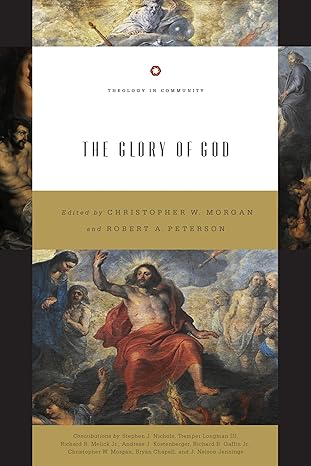Today we continue our interview with Dr. Chris Morgan, co-editor with Dr. Robert Peterson of The Glory of God, in Crossway’s popular Theology in Community series. If you missed Part 1 of this interview you can catch up here.
Books At a Glance (Fred Zaspel):
Many often ask, “If God’s ultimate purpose is to glorify himself, does that mean God is selfish?” How do you address such a question?
Morgan & Peterson:
 “If God seeks his glory above all things, does this mean that he is selfish? After all, if we seek our own glory, we are deemed selfish.” The standard answer to this common question is that God is the ultimate being and the highest end, and we are not. Good behavior seeks the highest end, so God making himself his own ultimate end is appropriate. If we make ourselves the highest end, however, we are acting inappropriately because we treat ourselves as the highest end when we are not.
“If God seeks his glory above all things, does this mean that he is selfish? After all, if we seek our own glory, we are deemed selfish.” The standard answer to this common question is that God is the ultimate being and the highest end, and we are not. Good behavior seeks the highest end, so God making himself his own ultimate end is appropriate. If we make ourselves the highest end, however, we are acting inappropriately because we treat ourselves as the highest end when we are not.
This standard response is surely correct and beneficial in many ways. But though correct and helpful, it would be strengthened by incorporating more of the biblical emphasis concerning God’s goodness and love. The bare response understates God’s genuine desire for the good of his creatures, and it fails to show how God’s love and his glory are united. Passages like Ephesians 1:3-14 and 2:1-10 showcase how God saves us out of love, displays his kindness toward us for all eternity, and is glorified through the entire display. Indeed, as we appropriately highlight the God-centeredness of God, we should stress the self-exalting God is also self-giving. As both self-exalting and self-giving, God saves us for his glory and our good. He gives himself to us, which simultaneously meets our needs and demonstrates his sufficiency. Thus, his love and glory cohere.
That God is simultaneously self-giving and self-exalting is also displayed in the mutual glorification of the persons of the Trinity. The glorious Father sends the glorious Son, who voluntarily humbles himself and glorifies the Father through his incarnation, obedient life, and substitutionary death (Phil. 2:5–11; cf. John 1:18; 6, 7:18; 10:1–30; 14:13; 17). In response the Father glorifies the Son, resurrecting him from the dead and exalting him to the highest place (Acts 3:13–15; Rom. 6:4; Phil. 2:9–11). The Father sends the glorious Spirit who glorifies the Son (John 16:14). And this all takes place to the glory of the Father (Phil. 2:11).
Each member of the Trinity gives to the others as a display of love and as a way of accomplishing cosmic redemption. The Son says to the Father, “I love you and the people you have given me, so I will undergo humiliation and suffering for you and them.” And then the Father responds to the Son, “I love you and these people, so for your sake and theirs, I want to raise and exalt you to the highest place and reputation.” Amazingly, through serving the Father, the Son is glorified, and through blessing the Son, the Father is glorified (Phil. 2:5–11). Further, the Father blesses the Son with people to save, depicted as love gifts from the Father. The Son, in turn, saves and keeps all of these love gifts, giving them back to the Father (John 6, 10, 17). The Father blesses the Son with gifts (us!), and the Son blesses the Father by giving the gifts in return. Plus, the Spirit communicates the gifts, disclosing what belongs to the Father and the Son to believers (John 16:14–15).
Jesus’ high priestly prayer also reveals that the self-giving and self-exalting triune God draws his redeemed people into the circle of fellowship, mutual blessing, and shared glory. Jesus begins his prayer, “Father, the hour has come, now glorify the Son that the Son may glorify you” (John 17:1). Notice that Jesus longs to be glorified not for his own benefit but for the glory of the Father and of his people (17:20–24). Such is the peculiar nature of Christ; he is the loving Lord who gives and serves (Matt. 20:26–28; John 13:1–17; Phil. 2:5–11). From that same verse we also learn that the Father grants glory to the Son because of his eternal love for the Son (17:24).
Does any of this sound selfish? Not at all! The Father is out to bless the Son, and the Son is out to bless the Father! The mutuality and reciprocating love of God displayed within the Trinity flows outward even to bless us. Through union with Christ, we are recipients of God’s love and his manifold blessings, including forgiveness of our sins, adoption into his family, and final glorification (17:22). And because it is God who accomplishes all of this, it is for his glory, and it is for our good.
Books At a Glance:
What are some ways in which God displays his glory in biblical history and in biblical teaching?
Morgan & Peterson:
The breadth and depth of Scripture on this are enormous. In a way that is consistent but by no means uniform, every major section of Scripture addresses the subject of the glory of God: Law, Prophets, Writings, Gospels, Acts, Pauline Epistles, General Epistles, and Revelation. Every major doctrine is also significantly related to it: revelation, God, humanity, sin, Christ, salvation, the church, and eschatology. Further, many key turning points in the biblical story stress God’s glory and attest to its varied manifestations: creation; humans being created in the image of God, crowned with glory; the Exodus; fire/bright light/shining; a cloud; the Sabbath; God’s presence; the tabernacle; filling the earth; the temple; above the heavens; visions; Israel; Christ, including his incarnation, birth narratives, miracles, transfiguration, suffering, crucifixion, resurrection, ascension, session, reign, and coming; the Holy Spirit; the church; the new creation.
Books At a Glance:
Definitions are important, and it seems that for many God’s “glory” is a rather vague concept. So just what do the biblical writers have in mind when they speak of “the glory of God?
Morgan & Peterson:
As we might expect concerning a truth so interwoven into the fabric of the biblical story, we find that the Bible speaks of the glory of God in different senses. This is partly why God’s glory is, as John Frame acknowledges, of one the hardest Christian terms to define.
At a basic level, it is helpful to notice that the glory of God is sometimes used in the Bible as an adjective, sometimes a noun, and sometimes a verb. God is glorious (adjective), reveals his glory (noun), and is to be glorified (verb).
More particularly, “glory” translates the Hebrew term kabod and the Greek term doxa. Kabod stems from a root that means weight or heaviness. Depending on its form, it could have the sense of honorable, dignified, exalted, or revered. C. John Collins explains that it became “a technical term for God’s manifest presence.” It is similar in many respects to the concept of God’s name in the Old Testament.
According to Sverre Aalen, doxa in secular Greek refers to an opinion, conjecture, repute, praise, or fame. He maintains that the concepts were transformed by the Septuagint. Aalen also maintains that doxa translated kabod and took on the same meaning, referring to God’s manifestation of his person, presence, and/or works, especially his power, judgment, and salvation.
Using these terms, the Bible speaks of the glory of God in several distinct senses.
1. Glory is used as a designation for God himself.
2. Glory sometimes refers to an internal characteristic, attribute, or a summary of attributes of God.
3. Glory as God’s presence.
4. Glory as the display of God’s attributes, perfections, or person.
5. Glory is as the ultimate goal of the display of God’s attributes, perfections, or person.
6. Glory sometimes connotes heaven, the heavenly, or the eschatological consummation of the full experience of the presence of God.
7. Glory as God’s power to strengthen his people.
8. Giving glory to God also may refer to appropriate response to God in the form of worship, exaltation, or exultation
Books At a Glance:
Could you explain for us what you mean when you refer to the intrinsic and the extrinsic aspects of God’s glory?
Morgan & Peterson:
The glory of the triune God is both intrinsic and extrinsic. God is intrinsically glorious, in the sense of fullness, sufficiency, majesty, honor, worth, beauty, weight, and splendor. God’s glory is then extrinsically set forth, as John Calvin memorably put it, that the world might be a theater his glory. Because of God’s gracious communication, his glory is something that may be seen, marveled at, and rejoiced in. Jonathan Edwards especially saw this and helpfully referred to God’s glory as internal and also as a communication of himself.
Books At a Glance:
What are some of the historical treatises on the glory of God that are still worth reading today?
Morgan & Peterson:
Two of our favorites are John Owen, The Glory of Christ, and Jonathan Edwards, The End for Which God Created the World.
Books At a Glance:
You have produced several titles now in Crossway’s Theology in Community series, and we hope to feature at least some of them here on Books At a Glance. Are there more volumes on the way?
Morgan & Peterson:
Six volumes are currently in print:
Suffering and the Goodness of God
The Glory of God
The Deity of Christ
The Kingdom of God
Fallen: A Theology of Sin
Heaven
The Love of God is scheduled to come out this fall.
Biblical Spirituality will follow that.
We have also used similar structures in other edited volumes:
Hell under Fire (Zondervan)
Faith Comes by Hearing: A Response to Inclusivism (IVP)
Is Hell for Real? (Zondervan)
The Community of Jesus: A Theology of the Church (B&H)
Why We Belong: Evangelical Unity and Denominational Diversity (Crossway)
Editor’s Note: You can see more on Crossway’s Theology in Community series here.

